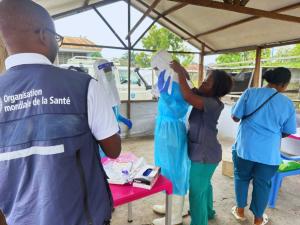Tackling mpox through global and local collaboration in the Democratic Republic of the Congo
Kinshasa – Mpox continues to strain the Democratic Republic of the Congo’s health system. Between 1 January and 31 May 2025, the country reported more than 12 000 suspected cases and 22 deaths, accounting for over 50% of all mpox cases in Africa this year.
In response, World Health Organization (WHO) and the Global Outbreak Alert and Response Network (GOARN) are supporting the country’s efforts to strengthen clinical care, improve detection and build the skills and engagement of frontline responders.
GOARN, a network coordinated by WHO that supports countries respond to health emergencies by deploying personnel and resources, mobilized seven specialists to support Democratic Republic of the Congo’s mpox response. Working both on the ground and remotely from Nairobi, the team provided expertise in treatment, data analysis, epidemiology, and disease surveillance.
Among them was Dr Andre Basilua Muzembo, a case management specialist from the University of Hyogo in Japan. Over nearly two months, he worked with health professionals at national level and WHO teams covering logistics, infection prevention, vaccination, and mpox response to ensure effective coordination.
At Clinique Kinoise, Kinshasa’s main referral centre for severe mpox cases, he provided support to help address critical challenges. The facility, with 42 beds and an average of 20 patients, operated with just around five out of 95 staff trained on mpox management. Chronic shortages of gloves, medicines, and essential equipment, combined with limited access to laboratory testing and difficult working conditions, contributed to a mortality rate of around 10%.
During more than 30 visits to five mpox treatment centres across Kinshasa, mainly in Clinique Kinoise, he mentored staff in compassionate care, worked with colleagues to improve hygiene practices and helped coordinate delivery of medicines and medical supplies. He also worked closely with Kokolo, Vijana, Masina Cinquantenaire and Kinkole treatment centres to streamline referrals and maintain continuity of care.
The response team placed special attention to high-risk groups, including children, pregnant women, and people living with HIV. Some pregnant patients arrived with foetal deaths, partly due to difficulties in accessing essential diagnostic tools such as ultrasound. In collaboration with the National AIDS Control Programme (PNMLS) and Médecins Sans Frontières (MSF), at least five HIV-Mpox co-infected patients were referred for specialized treatment.
When two mpox cases were detected in a Kinshasa orphanage, an emergency vaccination reached 30 people at risk. Alerts on cases of infected prisoners at Kokolo Hospital, followed by more than 30 cases reported at Ndolo prison, underscored the need for sustained outreach in vulnerable settings.
As part of efforts to strengthen the health system beyond the immediate response, 59 front-line workers, including 27 doctors and 32 nurses from the Clinique Kinoise received training in clinical management of mpox.
Heavy flooding then complicated the outbreak response, requiring a more coordinated and multisectoral efforts. Response teams faced overlapping emergencies—managing mpox and cholera while supporting displaced communities. At four evacuation sites, including Stade Tata Raphaël and Bandalungwa, WHO and partners delivered essential supplies such as medicines, cholera kits, and hygiene items.
"Despite extremely difficult working conditions, I witnessed how important it was to work to save lives with determination, compassion and team spirit. Resilience is not just about coping with adversity, it's about living through it with those affected, listening to those on the edge of despair and doing what we can with even the most modest of means," says Dr Muzembo.
These deployments are possible thanks to the support of UK public health rapid support team, Public health agency of Canada, Research institute of nursing care for people and community, University of Hyogo, and European centre for disease prevention and control.
“This mission underscores the critical importance of partnership and collaboration in health emergencies,” said Dr Jerry-Jonas Mbasha, GOARN focal point at WHO Regional Office for Africa and WHO operational partnerships officer. “GOARN is a vital pillar in the Global Health Emergency Corps, ensuring a coordinated health emergency workforce that is both rooted in countries and connected regionally and globally.”
“GOARN brings in targeted expertise to address critical gaps on the ground. With hands-on support and capacity strengthening, we are empowering countries to manage emergencies themselves. While the challenges in DRC remain, our continued mission is to work together, contain the outbreak, and build long-term resilience in the health system,” says Dr Mbasha.
As the DRC continues to respond to mpox, joint efforts by national and international partners highlight the importance of collaboration. "This mission has not only helped us respond to the outbreak but also strengthened the local health system in ways that will last well beyond the end of the current crisis," says Dr Boureima Hama Sambo, WHO Representative in the Democratic Republic of the Congo.
Donor Communication Officer
WHO Office for Africa
Email: moncadan [at] who.int (moncadan[at]who[dot]int)
Communications Officer
WHO DRC
Tel : +243 81 715 1697
Office : +47 241 39 027
Email: kabambie [at] who.int (kabambie[at]who[dot]int)
